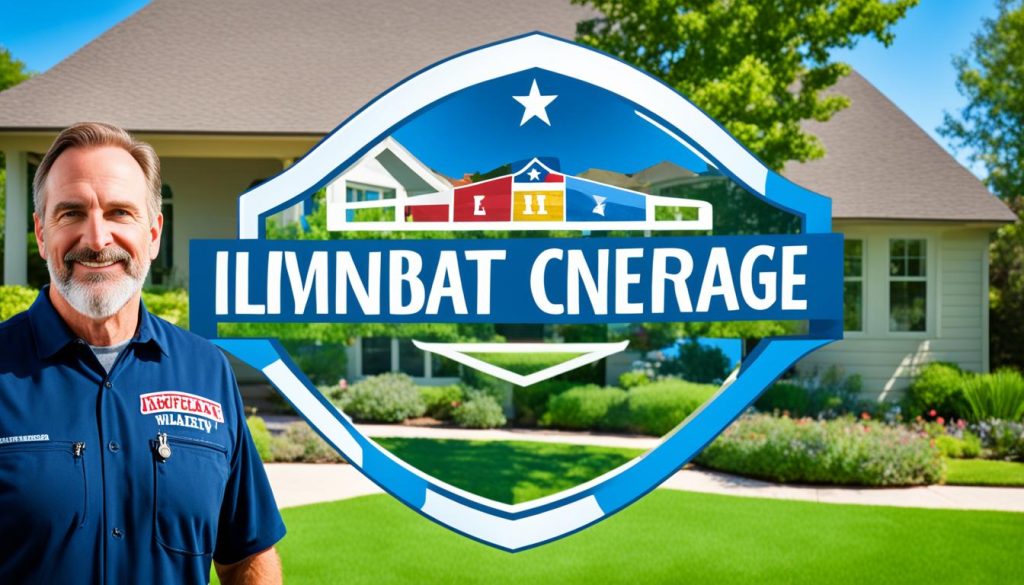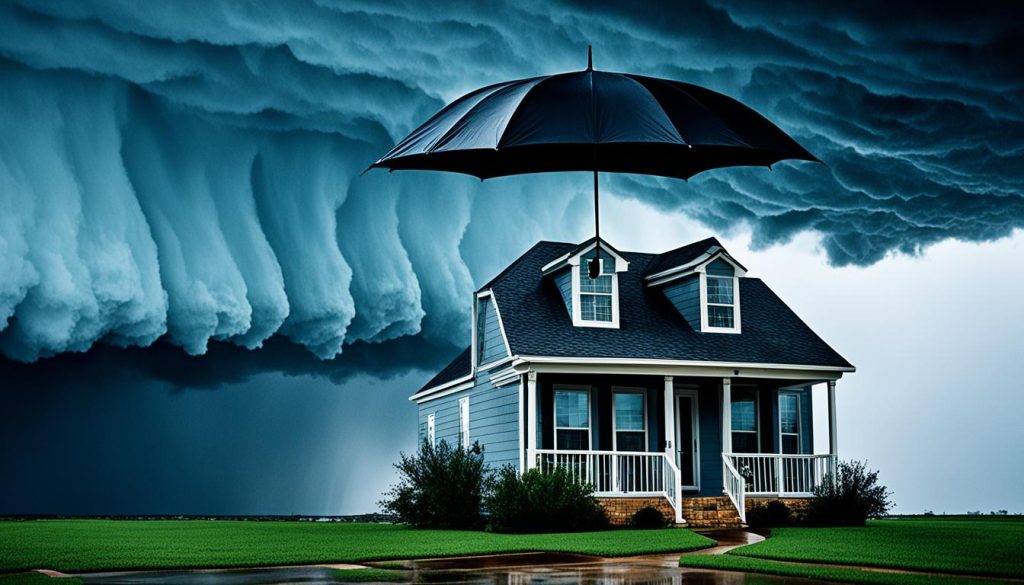As a home inspector in Texas, ensuring the safety and well-being of your clients is your top priority. However, accidents and unforeseen circumstances can still occur, putting your business at risk. That’s why Texas home inspector insurance is essential to protect yourself, your clients, and your reputation.
Having reliable home inspector liability coverage gives you the peace of mind knowing that you are financially protected in case of any claims or legal issues. It safeguards your business from potential lawsuits and ensures that you can continue providing your valuable services without disruptions.
In this comprehensive guide, we will explore the essentials of Texas home inspector insurance, including the best insurance options available for Texas home inspectors. We will also dive into the importance of having adequate coverage to meet the unique challenges of the industry. With the right insurance in place, you can confidently perform inspections, deliver accurate reports, and protect every corner of your business.
Key Takeaways:
- Texas home inspector insurance is vital for protecting your business from potential claims and legal issues.
- Having reliable home inspector liability coverage gives you peace of mind and ensures business continuity.
- Choosing the best insurance options for Texas home inspectors is crucial to meet industry-specific needs.
- With adequate coverage, you can confidently perform inspections and deliver accurate reports to your clients.
- Protecting every corner of your business with the right insurance is essential for long-term success and client satisfaction.
Rewarding Home Inspectors for Managing Risk
Insurance providers understand the efforts home inspectors put into preventing claims. That’s why they offer rewards for risk management. These rewards include contract discounts, diminishing deductibles, and early reporting discounts.
Contract discounts are awarded to insured inspectors who execute state-specific pre-inspection agreements, providing a deductible discount on covered claims.
Diminishing deductibles reduce the E&O deductible for each consecutive policy period without a claim, incentivizing home inspectors to maintain a clean claims history.
Early reporting discounts encourage prompt claims reporting by offering deductible waiver endorsements. This not only saves on insurance costs but also demonstrates a commitment to proactive risk management.
These rewards help home inspectors save on insurance expenses while promoting a culture of risk prevention. By proactively managing risks and adhering to industry best practices, home inspection businesses can not only protect themselves but also enhance their reputation and build trust with clients.

Implementing risk management strategies and availing of the benefits provided by insurance providers is a smart move for home inspectors. From the first inspection agreement to the prompt reporting of any claims, these rewards create a win-win situation for both insurers and inspectors.
Identifying Demand and Opportunities in the Property Inspection Market
The property inspection industry is influenced by market trends and customer needs. Understanding these trends and needs can help home inspectors identify opportunities for growth and expansion.
Market trends in the property inspection business are highly impacted by fluctuations in home sales and regulatory changes. For instance, as the real estate market experiences an upswing, the demand for inspection services increases. On the other hand, changes in regulations, such as the introduction of stricter building codes or environmental policies, can also influence the demand for inspections.
Meeting customer needs is essential for success in the competitive property inspection landscape. Customers want comprehensive and efficient inspections that give them peace of mind regarding the condition of the property they are considering purchasing. Providing clear and detailed reports, coupled with exceptional customer service, is key to satisfying their needs.
Moreover, home inspectors can leverage technological advancements to enhance their services and gain a competitive edge. Using advanced inspection tools, such as thermal imaging cameras or drone technology, allows inspectors to provide more accurate and thorough assessments. Embracing these new technologies can attract tech-savvy customers and set inspectors apart from their competitors.
Another strategy to explore is specializing in niche areas within the property inspection market. Focusing on energy efficiency inspections or becoming an expert in historic homes, for example, could attract specific customer segments and create unique opportunities for business growth.
Staying updated with market trends, effectively marketing services, and adapting to customer feedback are crucial for thriving in the property inspection market. This includes regularly researching industry news, monitoring changes in the real estate market, and adapting inspection practices accordingly. By actively listening to customer feedback and addressing their concerns, home inspectors can build trust and loyalty, fostering long-term success.

Meeting the Requirements for a Successful Home Inspection Career in Texas
Before embarking on a career as a home inspector in Texas, it’s crucial to understand and meet the necessary licensing, training, and certification requirements. By fulfilling these prerequisites, you can establish a solid foundation for a successful and reputable career in the industry.
Getting licensed as a home inspector in Texas involves completing 154 hours of coursework approved by the Texas Real Estate Commission. This comprehensive training covers essential topics like construction technology, home inspection standards, and building codes. It ensures that you have a thorough understanding of the intricacies involved in conducting a professional inspection.
Once your coursework is completed, you’ll need to pass the National Home Inspector Examination to obtain your license. This examination assesses your knowledge of the home inspection process, including structural components, electrical systems, plumbing, and HVAC, among others. A passing score on this exam demonstrates your proficiency in the field.
Training programs play a crucial role in preparing aspiring home inspectors for their careers. Texas offers various training options through community colleges and online platforms. These programs provide hands-on experience, practical knowledge, and insights into industry best practices. Engaging in these training programs not only expands your knowledge but also helps build the confidence needed to excel in the field.
The American Society of Home Inspectors (ASHI) certification adds credibility to your career and demonstrates your commitment to professional standards. As a recognized body within the industry, ASHI offers a rigorous certification process that evaluates your knowledge and expertise. Achieving this certification will help you stand out among your peers and gain the trust of potential clients.
Continuing education is a crucial aspect of any home inspector’s career. Staying updated with industry practices, new regulations, and emerging technologies enhances your ability to provide top-notch services. Ongoing education ensures that you remain knowledgeable in the ever-evolving field of home inspection.
If you’re interested in specializing in certain areas of home inspection, additional training may be necessary. For example, radon or mold inspection requires specific expertise and certifications. By undergoing specialized training in these niche areas, you can expand your service offerings and cater to a broader range of client needs.
Lastly, it’s essential to protect yourself and your clients by carrying liability insurance and being bonded. Home inspector liability coverage serves as an added layer of protection against potential claims that may arise from the inspection process. It also ensures that you comply with legal requirements and demonstrate your commitment to safeguarding your clients’ interests.

Protecting Your Home Inspection Business with Insurance
Insurance and liability coverage are essential for protecting your home inspection business. As a home inspector, you face various risks and potential liabilities during the course of your work. Navigating the legal aspects of the business, obtaining necessary licenses, and adhering to industry regulations are non-negotiable to ensure legal compliance and protect your clients’ interests.
Carrying liability insurance and being bonded provide crucial protection for your home inspection business. Texas home inspector insurance offers liability coverage that safeguards you against potential claims and legal repercussions. This coverage ensures that you can confidently conduct inspections and provide accurate reports, knowing that you are protected from any unforeseen circumstances that may arise.
One specific type of insurance that is particularly important for home inspectors is Errors and Omissions (E&O) insurance. This coverage protects you in case of inadvertent mistakes or omissions made during inspections. E&O insurance not only provides financial protection for potential claims but also helps to maintain your professional reputation.
Securing comprehensive insurance coverage is vital for your home inspection business. Comprehensive coverage includes liability insurance, E&O insurance, and other protective insurance policies to ensure that you have a well-rounded and robust insurance portfolio.
Compliance with legal requirements and securing protective insurance coverage are crucial steps in building a successful and reputable home inspection business. Taking the time to understand and navigate the complexities of the insurance landscape will give you peace of mind and protect your business interests.

Safeguarding Your Home Inspection Business for Success
Protecting your home inspection business in Texas is essential for long-term success and peace of mind. Texas home inspector insurance is a vital component of safeguarding your business against unforeseen risks and liabilities. By understanding the importance of risk management, identifying opportunities in the property inspection market, and meeting legal requirements, you can build a successful and sustainable home inspection business.
Managing risks is crucial for any business, and home inspection is no exception. With the right home inspector liability coverage, you can protect your business from potential claims that may arise during inspections. Adequate insurance coverage not only safeguards your financial interests but also ensures that your clients have trust and confidence in your services.
Furthermore, staying informed about market trends and customer needs can help you identify opportunities for growth and expansion. By leveraging technological advancements, specializing in niche areas, and delivering comprehensive and efficient services, you can stand out in the competitive property inspection market.
Most importantly, meeting the licensing and training requirements for home inspectors in Texas is essential. Obtaining the necessary certifications, continuing education, and adhering to industry regulations demonstrate professionalism and competence. Prioritizing insurance and liability coverage, such as Texas home inspector insurance, provides additional protection and demonstrates your commitment to client satisfaction and legal compliance.




No comments! Be the first commenter?